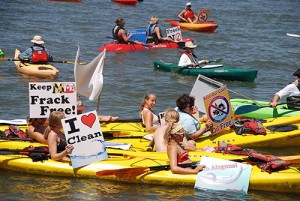
BERLIN– Two more area towns have joined the growing list of municipalities making known their opposition to seismic testing in the Atlantic Ocean.
Officials in Berlin and Fenwick Island both passed resolutions outlining their concerns with seismic testing. Fenwick leaders approved a resolution Friday after a presentation from Assateague Coastal Trust while Berlin’s council passed a resolution Monday. Berlin is now the 102nd town on the East Coast to do so.
“You all should be proud of taking a public stance on that,” Berlin Mayor Gee Williams told council members after the vote.
Seismic drilling has been a hot topic up and down the coast since the federal Bureau of Ocean Energy Management (BOEM) began evaluating permits from private entities interested in performing seismic air gun testing in the Atlantic Ocean to identify oil and natural gas deposits.
Local environmental groups have voiced their concerns with potential seismic testing from the start and have lobbied area politicians, held public meetings and even hosted a “Float for the Coast” rally in the bay last summer.
According to Matt Heim of Assateague Coastal Trust, the environmental community is worried about the testing for a number of reasons. He said the majority of the oil available in the Atlantic was in fact off the Delmarva coast.
“It is locally relevant,” he said.
Nevertheless, the entire Atlantic only represents four percent of the country’s oil reserves. According to Heim, the Atlantic contains what would amount to an eight month supply of oil and a 21 month supply of natural gas. The portion of the ocean being considered for drilling in the near future would represent just a fraction of that. Drilling would open the area up to the risk of oil spills.
“It’s not a matter of if there’s going to be a spill it’s when…,” Heim said. “There’s really no such thing as safe drilling.”
The seismic air gun testing municipalities up and down the coast have been objecting to has to be completed before drilling could take place.
“It emits one of the loudest manmade sounds on earth,” he said.
Because they’re looking for oil and gas deposits so far below the seafloor, the guns used are extremely loud, according to Heim. Vessels tow arrays of 30-40 air guns, which are fired nearly continuously.
“That 250 decibel sound is fired every 10 seconds 24/7 for the duration of a mapping exercise which can be several weeks or months,” he said.
That, he went on, can have huge implications for wildlife. Areas where seismic air gun testing has occurred in the past have seen numerous wildlife strandings. Heim said in Peru, testing resulted in 900 dolphins and 1,500 seabirds coming to shore. In Madagascar, 100 whales came to shore. Similar incidents have occurred elsewhere.
“Anything that can get out of the way of this sound will,” he said.
That could have an impact on the area’s commercial fishery. Heim said that in an area off Africa where testing was performed, a $2 billion tuna fishery was decimated. Boats catching 4,000 tons of fish only brought in 643 tons of fish after the testing.
Locally, air guns could harm horseshoe crabs. Heim said research had shown that seismic testing caused internal damage to crabs.
“The reproductive organs of female crabs are particularly susceptible,” he said.
If creatures like horseshoe crabs were affected, it could set off a chain reaction on Delmarva, Heim said, pointing out that some species of birds even timed their migration so it coincided with horseshoe crab spawning.
“The ripple effects to the ecosystem would stretch from the Artic to South America,” he said. “This is a local issue that has the potential to be very far reaching.”
BOEM is currently in the process of reviewing comments that have already been made by interested parties and is putting together a management plan for 2017-2022. Heim says BOEM will release the proposed program soon and then will offer another public comment period. He says ACT has been encouraging the local beach communities to make known their opposition to testing and drilling in the meantime.
“We feel like coastal communities are most at risk from this proposal and need to take a stance,” he said.
